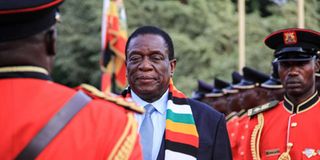Bishops criticise crackdown on dissent by Zimbabwe's Mnangagwa

Zimbabwe's president Emmerson Mnangagwa (2nd L) reviews a guard of honour at the state house during his official visit to attend Uganda's 57th independence day in Entebbe, Uganda, on October 8, 2019.
What you need to know:
- In a pastoral letter read out at Catholic churches on Sunday, the Zimbabwe Catholic Bishops Conference (ZCBC) said the country was drifting towards chaos.
- The bishops' hard-hitting letter followed weeks of alleged abductions and arrest of government critics that followed the July 31 protests against corruption.
- The relationship between the Catholic Church and the Zimbabwean government has been characterised by hostilities over excesses by security forces.
Zimbabwe's Catholic bishops have criticised President Emmerson Mnangagwa's crackdown on dissent, which they say is unprecedented.
In a pastoral letter read out at Catholic churches on Sunday, the Zimbabwe Catholic Bishops Conference (ZCBC) said the country was drifting towards chaos.
"Fear runs down the spine of many of our people today," the letter said. "Is this the Zimbabwe we want? To have a different opinion does not mean to be an enemy."
The bishops' hard-hitting letter followed weeks of alleged abductions and arrest of government critics that followed the July 31 protests against corruption.
Security forces were deployed to crush the protests.
Prominent investigative journalist Hopewell Chin'ono and opposition leader Jacob Ngarivhume, who used social media to encourage Zimbabweans to join the protests, were arrested for allegedly plotting to topple President Mnangagwa.
Government outraged
The letter, however, drew an angry response from the government, which described it as an “evil message” meant to stoke a “Rwanda-style genocide”.
Information minister Monica Mutsvangwa singled out the head of the Catholic Church in Zimbabwe, Archbishop Robert Ndlovu, for a vitriolic attack.
"His transgressions acquire a geopolitical dimension as the chief priest of the regime change that is the hallmark of the past major Western powers for the last two decades," Ms Mutsvangwa said in a statement.
She claimed the bishops were angry that the July 31 protests did not achieve the objective of toppling President Mnangagwa.
The relationship between the Catholic Church and the Zimbabwean government has been characterised by hostilities over excesses by security forces.
In the 1980s, Catholic bishops helped uncover atrocities by a North Korean trained crack army unit, with human rights groups saying over 20 000 unarmed civilians were massacred in south western Zimbabwe.
The bishops also regularly drew the world's attention to human rights abuses by the regime of the late Robert Mugabe.
Blame game
Meanwhile, the country’s largest grouping of churches, the Zimbabwe Council of Churches (ZCC) immediately threw its weight behind the Catholic bishops, saying its letter summed up the dire economic and human rights situation.
The ZCC accused President Mnangagwa's government of refusing to take responsibility for its shortcomings.
"The blame shifting labelling of critical voices as regime change agents, and recently terrorists, smacks of the government's unwillingness or inability to engage on the basis of ideas as well as robbing citizens of any hope that things can change," the ZCC said.
"The denialism that characterises the government of Zimbabwe's handling of criticism has now become a deeply worrying trend."
The churches urged President Mnangagwa to “provide leadership by retracting the personal attacks on Archbishop Ndlovu and the church leaders".
Attempted intervention
President Mnangagwa last week blocked South African President Cyril Ramaphosa 's special envoys from meeting opposition groups, saying there was no crisis in Zimbabwe to warrant the neighbouring country's intervention.
President Ramaphosa had dispatched the envoys following concerns over the government's clampdown against critics.
President Mnangagwa’s government blames the political chaos on the opposition, which it claims is working with Western countries to destabilise the country.
The opposition MDC Alliance says over 30 of its activists have since been forced into hiding following a spate of arbitrary arrests and abductions.
The African Union and the United Nations are some of the major international bodies that have voiced concern over the situation in Zimbabwe.





